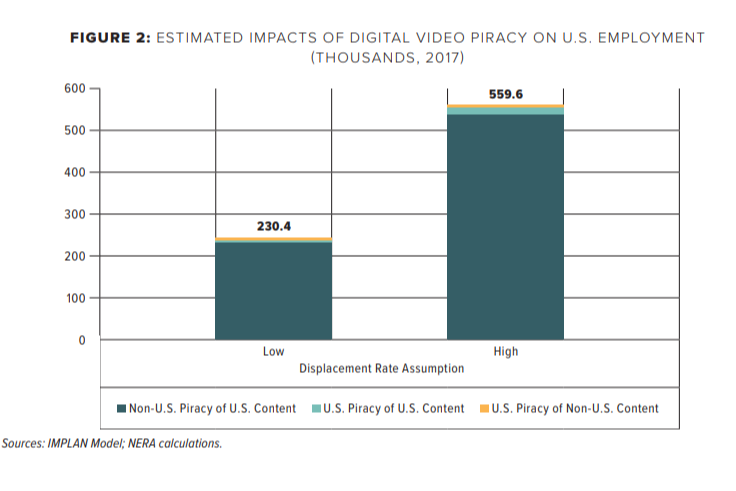Online piracy costs US almost $30bn a year, according to Chamber of Commerce. Pirated videos viewed over 200bn times in 2018. Piracy results in up to 560,000 industry job losses.

Online piracy costs the US economy almost $30 billion a year, with pirated videos viewed over 200 billion times, according to a report from the US Chamber of Commerce.
The movie and television sector brought in around $230 billion in revenue in 2017, but streaming is a big problem. The report from Chamber of Commerce’s Global Innovation Policy Center found the cost of piracy could even be as high as $71 billion a year.
The GIPC’s report, which was released in partnership with NERA Economic Consulting, found that piracy carried out across streaming services have now surpassed download-based piracy as the primary vehicle for pirated videos. 80% of piracy is attributable to streaming compared with just a few years ago, when BitTorrent downloads accounted for nearly 40% alone.
Pirated TV shows have the highest demand, with more than 230 billion views every year worldwide, with the vast majority coming from outside the US. 126 billion of these views were of content produced in the US. Popular TV shows like Game of Thrones went to great lengths to reduce piracy ahead of its final season.
The film industry is also suffering due to piracy, with 26.6 billion illegal views of US-produced films, according to the study.
The impact of piracy on the industry is split across production and distribution. The former loses between $12.4 to $40 billion annually, while distribution sees losses between $900 million and $2.1 billion a year in the film sector. In the digital TV sector, the figures are between $14.7 billion to $35.7 billion for production and between £1.3 billion and $3.1 billion for distribution.
The impact of piracy isn’t limited to loss of revenue, however, with the GIPC’s report also assessing the impact on jobs. It found that digital video piracy resulted in between 230,000 and 560,000 job losses per year. In terms of GDP, piracy saw a reduction of US GDP between $47.5 billion and $115.3 billion in 2018.
David Hirschmann, president and CEO of the GIPC, said: “Digital video piracy results in significant losses to the U.S. economy, harming businesses ranging from content production firms to the innovative technology companies that are driving the digital distribution revolution.
“While there is no single solution, global collaboration among industries and governments to educate consumers of the dangers of piracy, coupled with the expansion of legal options in cases of infringement, is necessary to curb these negative effects. All parties must continue to work creatively and constructively to enable dreamers, innovators, and creators around the world to continue to tell their unique stories and advance our culture and economy.”
You are not signed in
Only registered users can comment on this article.

BBC appoints Rhodri Talfan Davies as Interim Director General
The BBC Board has confirmed that Rhodri Talfan Davies will act as Interim Director-General, after Director-General Tim Davie officially stands down on 2 April 2026. In doing so, the organisation has revealed that the process to appoint a new Director-General is underway.

Sky unveils plans for major redevelopment of Livingston campus
Sky has confirmed plans for a major investment in an expanded Scottish office in Livingston, having submitted a full planning application.

Christian Vesper steps down as Fremantle’s global drama and film CEO
Christian Vesper is to step down from his position as CEO of Global Drama and Film at production and distribution group Fremantle.

WPP launches single global production platform
Ad agency group WPP has launched a single production brand, WPP Production, to house its global production capabilities and teams.

Base FX opens London studio
Base FX, one of Asia's leading visual effects and animation studios, has opened a London studio as part of a strategic expansion into the European market.




